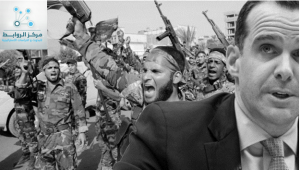It became clear to all of the features of the next political process in Iraq and trends of the political blocs and parties and their role in leading the political decision in Iraq for four years to come in the fifth government after the US invasion of Iraq, and after the announcement of the Electoral Commission on the progress of the Alliance (Saroon) to all participants of political parties and blocs in the elections so that it is imperative for all those seeking a political role to begin their consultations and meetings to start forming broad political alliances to reach the largest bloc in the House of Representatives to have the advantage in the nomination for the head of the ministry in Iraq and the division of the effectiveness of next work in the ministries and government institutions.
The Iraqi political scene has become complicated by the convergence of the number of electoral seats that each bloc has been able to obtain them. We are facing bilateral or tripartite alliances, each with its own destination and its Arab, regional and international relations, all of which seek to reap the benefits of its political activity and pursuit of the political decision-making platform after months of alliances, meetings and electoral activities which have established for a new stage in Iraq and could have implications on the nature of the current events in Iraq and the Arab region and its relationship to the reality of the field experienced by the people of the region.
Coalitions and Alliances began to take place in meetings between the leaders of blocs and talks and signals here and there about the nature of the next large bloc led by (Saroon) in which all seek to ally with it or move away from it to form a counter-axis against its aspirations and electoral achievements.
There is a clear political struggle that started before the elections between the blocs (Saroon and Fatah) and each of them has its own orientations and affiliations and objectives and the matter became clearer after the election results and each one sought to find a coalition that helps it to control the political decision in Iraq.
Here ,the International and regional influence, intervention was emerged represented by the American administration and the Iranian regime due to the importance of Iraq for the two parties in sustaining their interests and political projects and maintaining their balance in the region. Both Washington and Tehran have goals that seek them and try to preserve and sustain them to form a strategic depth for future events in the region in the light of political escalation and disagreement between USA and Iran. The escalation and political row between America and Iran.
US President Envoy Brett H. McGurk headed to Baghdad on May 13, a day after the end of the election process and the appearance of the initial results of the elections, and the US is aware of the decline of the alliance of al-Nasir which is of interest to the US. Brett McGurk started to arrange a number of meeting and consultations with heads of Iraqi political parties and blocs and try to draw the features of the next political stage and find political alliances that lead to support Abadi in a second term and here the Iranian tools were watching and closely follow these American attempts and learn its reality and objectives , then , the Iranian decision came when ( Qasem Soleimani) headed to Baghdad on May 15 to start a new and decisive phase of meetings with several blocks and names supported by Tehran and its organs and institutions and the first of these meetings was with Nuri al-Maliki, the biggest loser in the election results who is considered a strategic ally of Iran in Iraq , to evaluate the election process and its results and an attempt to find a common factor that brings together all Shiite political parties and blocs to reach a goal sought by Iran to continue its control and influence in Iraq by forming the largest bloc in the next political phase and to keep the Iraqi presidency under its dominance and influence.
That Iranian interference is a reality of the US invasion of Iraq and unleash and to ignore the process of Iranian expansion and encroachment on Iraq and consider it a key path to the realization of the Iranian project in the Arab region. We are facing a US-Iranian field political conflict in Iraq, both of which are seeking to preserve its interests in Iraq and to stay widely to achieve its political projects.
The political process in Iraq remains hostage to international and regional conflicts, and everyone should be aware of this fact.
Iraqi Studies Unit
Rawabet Center for Research and Strategic Studies

